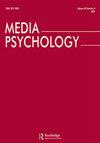Appetitive Food, Aversive Warning: Interaction Effects of Visual and Verbal Cues on Psychophysiological and Attitudinal Responses to PSAs
IF 2.6
2区 心理学
Q1 COMMUNICATION
引用次数: 0
Abstract
ABSTRACT The efforts to promote healthy eating remain ineffective. The inability of these campaigns to counter the marketing resources of the mainstream fast-food chains is among the primary explanations for such failures. However, from the information processing perspective, the message’s features may also play a significant role. Cue reactivity research has shown the importance of evaluating visual and verbal cues to avoid undesirable addictive behavioral outcomes. Bridging the evaluative space model (ESM) and the limited capacity model of motivated mediated message processing (LC4MP), the goal of this experiment is to further explore how food-related visual and verbal cues elicit psychophysiological reactivity and how this reactivity in turn affects attitudes toward the promotion. Multilevel modeling results showed that healthy food images paired with encouragement words elicited an uncoupled pattern of the appetitive system activation and received a predominantly positive attitude from audiences (N = 180). Results suggested that thematic congruent messages are preferred in health communication settings. Junk food images, regardless of being paired with encouragement or discouragement verbal cues, should be avoided due to their automatic activation of the appetitive motivational system.食欲食物,厌恶警告:视觉和言语线索对公益广告心理生理和态度反应的交互作用
促进健康饮食的努力仍然无效。这些活动无法对抗主流快餐连锁店的营销资源,这是造成这些失败的主要原因之一。然而,从信息处理的角度来看,消息的特性也可能发挥重要作用。线索反应性研究表明,评估视觉和言语线索对避免不良成瘾行为结果的重要性。本实验的目标是将评价空间模型(ESM)和动机介导信息处理的有限能力模型(LC4MP)连接起来,进一步探索与食物相关的视觉和言语线索如何引发心理生理反应,以及这种反应如何反过来影响对晋升的态度。多层次建模结果表明,健康食品图片与鼓励词搭配,引发了食欲系统激活的非耦合模式,并从观众那里获得了主要的积极态度(N=180)。结果表明,在健康沟通环境中,主题一致的信息是首选。垃圾食品图片,无论与鼓励或劝阻的言语暗示搭配,都应该避免,因为它们会自动激活食欲动机系统。
本文章由计算机程序翻译,如有差异,请以英文原文为准。
求助全文
约1分钟内获得全文
求助全文
来源期刊

Media Psychology
Multiple-
CiteScore
8.60
自引率
7.10%
发文量
30
期刊介绍:
Media Psychology is an interdisciplinary journal devoted to publishing theoretically-oriented empirical research that is at the intersection of psychology and media communication. These topics include media uses, processes, and effects. Such research is already well represented in mainstream journals in psychology and communication, but its publication is dispersed across many sources. Therefore, scholars working on common issues and problems in various disciplines often cannot fully utilize the contributions of kindred spirits in cognate disciplines.
 求助内容:
求助内容: 应助结果提醒方式:
应助结果提醒方式:


